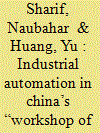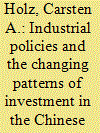| Srl | Item |
| 1 |
ID:
163767


|
|
|
|
|
| Summary/Abstract |
In July and August 2010, a series of spontaneous “defend-my-mother-tongue” protests took place in Guangzhou. At its climax, thousands of protestors took to the streets to oppose a government proposal to switch local television broadcasts from Cantonese to Mandarin. Unlike other recent mass incidents in China, the “Defend Cantonese” protests mainly involved a place-based identity politics through which participants purported to support maintenance of Cantonese culture without explicit political and material demands. Based on the testimonies of dozens of participants and witnesses, the authors identify three sets of schematic dichotomies that framed the protests: namely, south versus north, local differences versus national uniformity, and conserving traditional Guangzhou versus urban redevelopment. It is argued that underpinning the language movement’s cultural outlook was the participants’ discontent with current politics and distribution of resources. The cultural packaging constitutes a specific tactic through which the actors resisted the authoritarian regime without triggering violent suppression.
|
|
|
|
|
|
|
|
|
|
|
|
|
|
|
|
| 2 |
ID:
163764


|
|
|
|
|
| Summary/Abstract |
The Chinese government has announced major plans to provide subsidies to upgrade industry through automated manufacturing and robotization. This article examines how the government in the southern city of Dongguan, a leading center of the country’s export industry, has promoted a “Replacing Humans with Machines” initiative to improve the prospects for local manufacturers facing toughening business conditions since 2007. We explain the conditions that informed the “Replacing Humans with Machines” initiative, reveal findings based on numerous on-site interviews with officials, factory managers, and workers about the effects of automation in Dongguan, and analyze the implications for the labor market. We find that the subsidies awarded by the Dongguan government to support automation in local firms played only a minor role in the firms’ automation strategies. Instead, the main drivers of automation were competitive market pressures to reduce the workforce, step up productivity, improve product quality, and deal with occupational health and safety. Workers coping with the effects of automation have suffered variously from deskilling and displacement, although in some cases they were offered upskilling through additional training.
|
|
|
|
|
|
|
|
|
|
|
|
|
|
|
|
| 3 |
ID:
163765


|
|
|
|
|
| Summary/Abstract |
Investment has always played an important role in the economic development strategies of the People’s Republic of China. A major reform of the investment system in 2004 shifted the state’s focus from direct investment control to industrial policies designed to promote investment in specific economic sectors. But in reality, the industrial policies’ preferences have had little effect. The data suggest that investment patterns in China are largely divorced from the industrial policies, and, if anything, predate them. The significant shifts in investments across sectors and ownership forms that have taken place since the early 2000s appear driven far more by profitability considerations and private entrepreneurship than by government policies. The finding negates foreign concerns that the Chinese state via industrial policies such as “Made in China 2025” is creating national state-owned technological leaders.
|
|
|
|
|
|
|
|
|
|
|
|
|
|
|
|
| 4 |
ID:
163769


|
|
|
|
|
| Summary/Abstract |
Contrary to the official Chinese rhetoric about vesting more autonomy in public-sector service organizations and distancing them from local state agencies, increasing recentralization and bureaucratization of the service organizations are occurring. As an example, following several rounds of reforms, the public-sector service organizations in the environmental protection system in Guangzhou have either been directly integrated into the city’s Environmental Protection Bureau or brought under greater control by the Bureau. This article examines the process and the underlying reasons and analyzes what this case study explains about important generalizable trends in China’s local state-building.
|
|
|
|
|
|
|
|
|
|
|
|
|
|
|
|
| 5 |
ID:
163766


|
|
|
|
|
| Summary/Abstract |
One of the fundamental weaknesses of popular collective action in China is a lack of broad-based solidarity. This article examines the collective protests by workers at state-owned enterprises when many of them were restructured from the mid-1990s through the mid-2010s, which often led to downsizing, closures, or privatization. The article draws on interviews conducted with retirees and laid-off workers from 91 restructured state-owned enterprises in a city in Hunan Province, plus an in-depth case study of one factory there. The evidence shows that the local state was able to fragment labor activism not only by using intimidation and coercion to prevent broad-based mobilization but also by creating incentives for workers to pursue narrow identities and particularistic claims. This explains why the workers’ mobilization was often counterproductive—rather than building up group solidarity, their mobilization tended to divide and demoralize workers’ communities. The study examines the nature of the divisions between worker groups and shows which specific types of groups were able to persevere and which types were able to transcend a single firm in their claims. This article also indicates that divisions between worker groups were not always predetermined by socioeconomic cleavages but instead often resulted from workers’ interactions with the government and with each other. The findings provide insights into the limits of popular collective action in China.
|
|
|
|
|
|
|
|
|
|
|
|
|
|
|
|
| 6 |
ID:
163768


|
|
|
|
|
| Summary/Abstract |
As China urbanizes, more migrants need and expect public services. Many municipalities, however, resist and undermine elements of the central government’s urbanization strategy by deflecting demands for benefits instead of meeting them or denying them outright. Urban authorities sometimes do so by establishing nearly impossible eligibility requirements or requiring paperwork that outsiders struggle to obtain. At times they also nudge migrants to seek health care or education elsewhere by enforcing dormant rules or by shutting down a locally available service provider. Local officials use these ploys for both political and practical reasons. Limiting access isolates and disempowers migrants and is cheaper than offering benefits. Phantom services are a consequence of the localization of the household registration system (hukou 户口) and a sign that new axes of inequality and gradations of second-class citizenship have emerged.
|
|
|
|
|
|
|
|
|
|
|
|
|
|
|
|